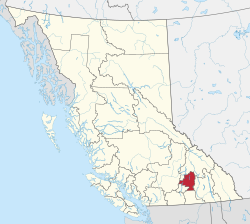Regional district in British Columbia, Canada
| North Okanagan | |
|---|---|
| Regional district | |
| Regional District of North Okanagan | |
 Rainbow over Lumby Rainbow over Lumby | |
 Location in British Columbia Location in British Columbia | |
| Country | Canada |
| Province | British Columbia |
| Administrative office location | Coldstream |
| Government | |
| • Type | Regional district |
| • Body | Board of Directors |
| • Chair | Kevin Acton (Lumby) |
| • Vice Chair | Amanda Shatzko (C) |
| • Electoral Areas |
|
| Area | |
| • Land | 7,502.60 km (2,896.77 sq mi) |
| Population | |
| • Total | 84,354 |
| • Density | 11.2/km (29/sq mi) |
| Website | www |
The Regional District of North Okanagan (RDNO) is a regional district in the Canadian province of British Columbia, Canada. The Canada 2011 Census population was 81,237. The land area is 7,512.58 km (2,900.62 sq mi). The regional district's head office is in the district municipality of Coldstream, although the largest population centre is its immediate neighbour, the city of Vernon.
Demographics
As a census division in the 2021 Census of Population conducted by Statistics Canada, the Regional District of North Okanagan had a population of 91,610 living in 38,821 of its 42,722 total private dwellings, a change of 8.6% from its 2016 population of 84,344. With a land area of 7,497.23 km (2,894.70 sq mi), it had a population density of 12.2/km (31.6/sq mi) in 2021.
| Panethnic group |
2021 | 2016 | 2011 | 2006 | 2001 | |||||
|---|---|---|---|---|---|---|---|---|---|---|
| Pop. | % | Pop. | % | Pop. | % | Pop. | % | Pop. | % | |
| European | 77,375 | 86.44% | 72,615 | 88.07% | 70,785 | 89.41% | 68,820 | 90.33% | 66,360 | 91.7% |
| Indigenous | 7,100 | 7.93% | 6,350 | 7.7% | 6,030 | 7.62% | 4,905 | 6.44% | 3,505 | 4.84% |
| South Asian | 1,390 | 1.55% | 900 | 1.09% | 540 | 0.68% | 835 | 1.1% | 1,135 | 1.57% |
| East Asian | 1,375 | 1.54% | 1,255 | 1.52% | 870 | 1.1% | 915 | 1.2% | 905 | 1.25% |
| Southeast Asian | 1,075 | 1.2% | 690 | 0.84% | 325 | 0.41% | 195 | 0.26% | 180 | 0.25% |
| African | 470 | 0.53% | 205 | 0.25% | 175 | 0.22% | 165 | 0.22% | 80 | 0.11% |
| Latin American | 295 | 0.33% | 205 | 0.25% | 170 | 0.21% | 150 | 0.2% | 70 | 0.1% |
| Middle Eastern | 225 | 0.25% | 140 | 0.17% | 105 | 0.13% | 95 | 0.12% | 40 | 0.06% |
| Other | 200 | 0.22% | 105 | 0.13% | 165 | 0.21% | 115 | 0.15% | 80 | 0.11% |
| Total responses | 89,510 | 97.71% | 82,455 | 97.75% | 79,165 | 97.45% | 76,190 | 98.56% | 72,370 | 98.83% |
| Total population | 91,610 | 100% | 84,354 | 100% | 81,237 | 100% | 77,301 | 100% | 73,227 | 100% |
Subdivisions
Cities
District municipalities
- Coldstream - 10,314
- Spallumcheen - 5,055
Village
- Lumby - 2,000
Regional district electoral areas
- North Okanagan B
- North Okanagan C
- North Okanagan D
- North Okanagan E
- North Okanagan F
Indian reserves NB These are excluded from governance by the regional district and have their own governments (the Spallumcheen Indian Band and the Okanagan Indian Band).
- Enderby Indian Reserve No. 2
- Harris Indian Reserve No. 3
- Okanagan Indian Reserve No. 1 (only partly within the RD)
- Priest's Valley Indian Reserve No. 6
Notes
- Statistic includes all persons that did not make up part of a visible minority or an indigenous identity.
- Statistic includes total responses of "Chinese", "Korean", and "Japanese" under visible minority section on census.
- Statistic includes total responses of "Filipino" and "Southeast Asian" under visible minority section on census.
- Statistic includes total responses of "West Asian" and "Arab" under visible minority section on census.
- Statistic includes total responses of "Visible minority, n.i.e." and "Multiple visible minorities" under visible minority section on census.
- Totals greater than 100% due to multiple origin responses.
References
- "Board of Directors". Retrieved July 9, 2019.
- ^ "Population and dwelling counts, for Canada, provinces and territories, and census divisions, 2016 and 2011 censuses – 100% data (British Columbia)". Statistics Canada. February 8, 2017. Retrieved July 9, 2019.
- "Population and dwelling counts: Canada and census divisions". Statistics Canada. February 9, 2022. Retrieved April 3, 2022.
- Government of Canada, Statistics Canada (October 26, 2022). "Census Profile, 2021 Census of Population". www12.statcan.gc.ca. Retrieved February 19, 2023.
- Government of Canada, Statistics Canada (October 27, 2021). "Census Profile, 2016 Census". www12.statcan.gc.ca. Retrieved February 19, 2023.
- Government of Canada, Statistics Canada (November 27, 2015). "NHS Profile". www12.statcan.gc.ca. Retrieved February 19, 2023.
- Government of Canada, Statistics Canada (August 20, 2019). "2006 Community Profiles". www12.statcan.gc.ca. Retrieved February 19, 2023.
- Government of Canada, Statistics Canada (July 2, 2019). "2001 Community Profiles". www12.statcan.gc.ca. Retrieved February 19, 2023.
External links
| Places adjacent to Regional District of North Okanagan | |
|---|---|